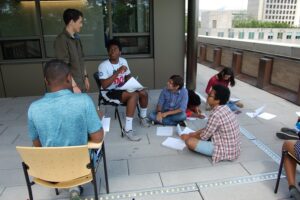Eleven years and counting with MIT PRIMES

PRIMES pairs high school students with MIT graduate students and postdocs to investigate unsolved problems in mathematics, computer science, and computational biology. (Photo courtesy of the Department of Mathematics)
In 2021, MIT marked the 11th anniversary of the launch of PRIMES, the MIT Program for Research in Mathematics, Engineering and Science for high school students. Led by chief research advisor, Professor Pavel Etingof, the free afterschool program attracts talented high schoolers from the greater Boston area and beyond who pursue original research with mentorship from MIT scholars. Over the past 11 years, PRIMES students made exceptional progress in mathematics, computer science, and computational and physical biology.
Since 2015, PRIMES has reached 70 percent of a $5 million endowment goal. Through generous gifts, PRIMES has strengthened programs, created named mentorships, and expanded offerings. MIT professor Daniel Stroock recently provided a gift to pilot an expansion of PRIMES-USA — the long-distance mentoring version of PRIMES for students outside the Boston area — to include sophomores in addition to juniors.
MIT alumni support has also been crucial. Stephen Berenson ’82 has been a longtime supporter of PRIMES (see “Paying back a debt with ‘exploration capital’ for MIT Math” on page 14). John “Jack” N. Little ’78 president and founder of MathWorks, provides much of the operational costs for MathROOTS, a two-week summer program for nationally selected students. Victor Menezes, SM ’72, created the Victor J. Menezes (1972) Challenge Fund in Mathematics to help support MathROOTS and PRIMES Circle. The Menezes Challenge PRIMES Circle is a local section dedicated to helping students develop their interest in mathematics and setting them on a path toward a math-based major in college. The program tripled from eight students in 2013 to 24 in 2021.
The success of these two programs targeting talented students from underrepresented groups was recognized with a MIT 2021 MLK Leadership Group Award for “deep and coordinated commitment to improving diversity in mathematics.”
The PRIMES proof is in the pudding—and in the research papers. In 2021, 120 students presented on their projects during PRIMES conferences. Moreover, students produced 66 research papers in 2020-21, bringing the total PRIMES papers to 284, with 61 published in academic journals or conference proceedings.
In national news, Yunseo Choi won first place and Gopal Goel fourth place in the 2021 Regeneron Science Talent Search, earning them $250,000 and $100,000 scholarships, respectively. Jessica Zhang won the 2nd Grand Award in Math and the 1st Special Award from the American Mathematical Society at the 2021 Intel International Science and Engineering Fair. William Li won the 3rd Grand Award in Math and an Honorable Mention from the American Mathematical Society.
PRIMES has formed a pipeline through which former students become mentors for a new generation of mathematical talent. Five alumni are currently math graduate students at MIT. Jonathan Tidor (PRIMES ’12, ’13; MIT ’17), is a graduate student who serves as a mentor in the Department of Mathematics’ Summer Program for Undergraduate Research (SPUR). He and his student shared the 2021 Hartley Rogers Jr. Prize for the best paper during the 2021 SPUR program.
Several other MIT mentors were recognized in 2021. The George Lusztig mentorships, funded by a contribution from MIT mathematics professor George Lusztig, were awarded to two PRIMES mentors, Chun Hong Lo and Adela (YiYu) Zhang, and PRIMES Circle coordinator Peter Haine. The Michael and Victoria Bershadsky mentorship was awarded to mentor and MathROOTS program director Andrey Khesin. Finally, the Menezes Challenge Mentorship in the MathROOTS program was awarded to math lecturer and head mentor Tanya Khovanova.
Out of 332 PRIMES alumni who reported their matriculation data, 45 percent enrolled at MIT, 21 percent at Harvard, and 7 percent at Stanford. Further, the quality of PRIMES applicants to MIT is growing: Last year MIT admitted more than 75 percent of PRIMES applicants.
This year, Sean Li won a $10,000 scholarship from the Davidson Institute and will be attending MIT next fall as a prospective math major in the class of 2026. “In a perfect world, I’d grow up to be a professor,” says Li. “I’d be teaching and researching, and I’d get paid for it!”
Sarah Costello | School of Science
This article first appeared in the Winter 2022 issue of Science at MIT.